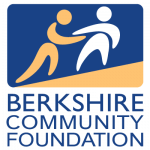Sponsored by the Berkshire Community Foundation

Project Leader: Ruth Montgomery (ruthmontgomery.co.uk)
Ruth considered it to be a very special privilege of meeting and working with some very young special children and teenagers and staff at Westwood Farm School and The Avenue School, which are both in Tilehurst, Reading
They covered many music topics which involved interaction, composing rhythms, drawings, music instruments, team work and singing. Some of the sessions are described below.
Westwood Farm School
It is a mainstream junior school with a resource base for the hearing impaired and specialist visiting Teachers of the Deaf. Deaf and hearing children worked together in this music project.
With Reception Children (4 years old):
The sessions started with - “Imaginary story music time”. The chairs were closely brought together as if the children were on a boat. The children sang “row, row, row your boat” with the music. Ruth sprinkled magic dust and they all went to sleep. When they woke up, they had arrived at the seaside! They sang sea side songs with the background music to the tune of Bobby Shaftoe, fish props, shakers and pretended to make sandcastles and put on their swimming costumes. They did Appuskiduski. Back onto the boat they sang “row, row, row your boat”. Sprinkling magic dust and they all went to sleep. When they woke up they found themselves at the North Pole! They put on our hats, scarves, and coat. They sang and played ‘Mulberry bush, on a cold and frosty morning’ and listened out for the swirling snowflake music with our fingers wriggling to the actions. Their next adventure was exploring the jungle with animal sounds of snakes, lion, frogs etc. As the night drew in they enjoyed the star props for Twinkle Twinkle little star. When they returned to the boat and woke up, they arrived back in the classroom! They had a lovely musical trip around the world. Their other topics at another time included looking into emotions and clapping in music time with instruments.
With Year 6 Boys
Ruth described the boys as wonderful, very receptive, calm and eager to learn. She introduced crotchets, quavers, and rest and they all clapped together as a group perfectly. They explored time signature changes 2 time, 3 time, and 4 time. They wrote their own ideas out in rhythm grids and were able to clap and time them for themselves.
With year 4 Boys
They played with hand chimes, making beautiful music, working together in time to the tune of Twinkle Twinkle Little Star. It also included looking at pitch perception – the size of the hand chimes represented the high/low of the sound. They made up some creative music such as the flowing waters and hot air balloon floating in the sky.
The Avenue School Special Needs Academy
Ruth considered this special needs academy supporting children of diverse and complex needs as “Aspiring”. None of the children were deaf but they relied on using Makaton sign language to communicate and to understand. It was a new opportunity for Ruth to spend more time working with special needs children as she had to change her plans to suit some of their mobility and abilities, and being aware of the attention span with a break half way through the sessions.
Ruth reported that they had so much fun with all sorts of topics. They looked at tempo where one plays fast/slow/lively/walking pace sort of music. They looked at how instruments make its sound with array of percussion instruments known as idiophones, plus pitched sounds. With the hand chimes they looked at the pentatonic sounds where music of Java only uses 5 notes. They did some music drawings about how they would describe sounds. They looked at music and emotions, making sleepy sounds or something with harshness. They performed ‘The Weather Symphony’ where they used sounds scape to create an event and weather changes.
After their breaks the last part of the sessions usually ending with singing and clapping time doing songs in 2, 3, 4, and 6/8 time along with Makaton sign language. They were all brilliant, with good eye contact, interaction and suggestions.